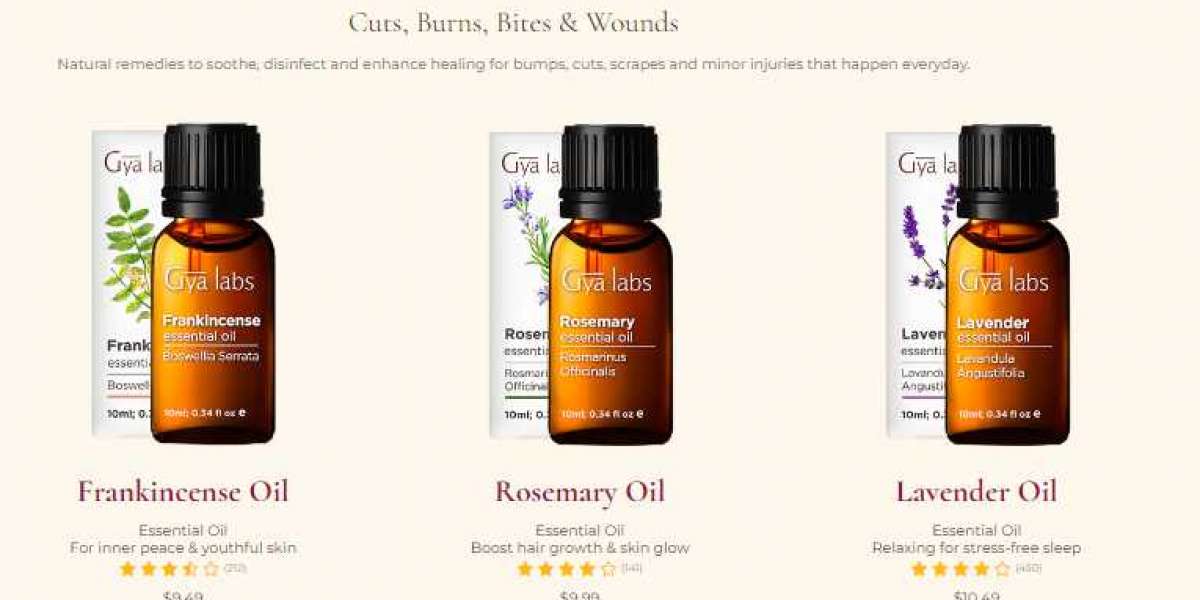Cuts and wounds are a part of life, and they can happen at any time. Whether it's a paper cut, a kitchen mishap, or a minor accident, having the right tools to promote healing is essential. Essential oils have gained popularity for their natural healing properties, and they can be incredibly beneficial when it comes to treating cuts and wounds. In this article, we'll explore the best essential oils for cuts and wounds and how they can aid in the healing process.
- Lavender Oil
Lavender oil is one of the most versatile essential oils and is a top choice for cuts and wounds. It possesses antimicrobial, anti-inflammatory, and analgesic properties, making it an excellent choice for minor cuts and scrapes. Lavender oil can help prevent infection, reduce pain, and promote faster healing. Its pleasant aroma also provides a soothing and calming effect, which can aid in reducing stress and anxiety associated with injuries.
To use lavender oil for cuts, simply dilute a few drops in a carrier oil (such as coconut or jojoba oil) and apply it to the affected area. It can be applied directly to the skin, as it's generally considered safe and gentle.
- Tea Tree Oil
Tea tree oil is renowned for its powerful antimicrobial and antibacterial properties, making it a go-to choice for treating cuts and wounds. It can help clean the wound and prevent infection, which is crucial for proper healing. Tea tree oil can also reduce inflammation and promote tissue regeneration, facilitating the recovery process.
To use tea tree oil, dilute a few drops in a carrier oil and apply it to the affected area. Be cautious not to use it on deep wounds, as it may cause irritation when applied to open flesh. It's an excellent choice for superficial cuts, scrapes, and insect bites.
- Chamomile Oil
Chamomile oil, specifically Roman chamomile, is known for its anti-inflammatory and soothing properties. It can help reduce pain, redness, and swelling associated with cuts and wounds. Chamomile oil is also gentle on the skin, making it suitable for all skin types, including sensitive skin.
To use chamomile oil, dilute it in a carrier oil and apply it to the injured area. Its calming scent can also help relax and reduce stress, which can be particularly useful when dealing with injuries.
- Helichrysum Oil
Helichrysum oil is often referred to as "Immortelle" due to its remarkable ability to support skin regeneration and reduce scarring. It has anti-inflammatory and analgesic properties, making it effective in reducing pain and promoting the healing of cuts and wounds. Helichrysum oil can help minimize scarring, which is especially valuable for more substantial injuries.
To use helichrysum oil, dilute it in a carrier oil and gently apply it to the affected area. It may be slightly more expensive than other essential oils, but its healing benefits are well worth it.
- Frankincense Oil
Frankincense oil has been used for centuries for its healing properties. It possesses anti-inflammatory, analgesic, and antimicrobial properties, making it a great choice for cuts and wounds. Frankincense oil can help reduce pain, inflammation, and prevent infection, promoting quicker recovery.
To use frankincense oil, dilute a few drops in a carrier oil and apply it to the injured area. Its earthy and woody aroma can also have a calming effect on the mind, which can be helpful during the healing process.
- Eucalyptus Oil
Eucalyptus oil is well-known for its antiseptic properties, making it an excellent choice for preventing infection in cuts and wounds. It can also provide pain relief and reduce inflammation. Eucalyptus oil has a refreshing and invigorating scent that can help uplift your mood while dealing with an injury.
To use eucalyptus oil, dilute it in a carrier oil and apply it to the affected area. It's particularly useful for cuts or wounds that have come into contact with dirt or bacteria, as it can help cleanse and disinfect the wound.
- Calendula Oil
Calendula oil, derived from marigold flowers, has been used for centuries for its skin-soothing properties. It is a gentle yet effective option for treating cuts, scrapes, and minor wounds. Calendula oil can reduce inflammation, pain, and promote the healing of damaged skin.
To use calendula oil, dilute it in a carrier oil and apply it to the injured area. It's safe for children and those with sensitive skin, making it a versatile option for the whole family.
Conclusion
Essential oils can be powerful allies in the healing process of cuts and wounds. They offer natural, holistic solutions that not only aid in preventing infection but also reduce pain, inflammation, and scarring. Whether you choose lavender, tea tree, chamomile, helichrysum, frankincense, eucalyptus, or calendula oil, you'll be harnessing the healing properties of nature to support your body's recovery.
When using essential oils for cuts, it's essential to dilute them properly in a carrier oil and perform a patch test if you have sensitive skin. Additionally, if a wound is deep, severe, or shows signs of infection, it's crucial to seek medical attention. Essential oils can complement traditional wound care, but they should not be a substitute for professional medical treatment when needed.
Incorporating these essential oils into your first-aid kit can help you and your loved ones deal with cuts and wounds more effectively while also promoting overall well-being. Remember that the right essential oil can make all the difference in the healing process, so choose the one that suits your needs and preferences.














